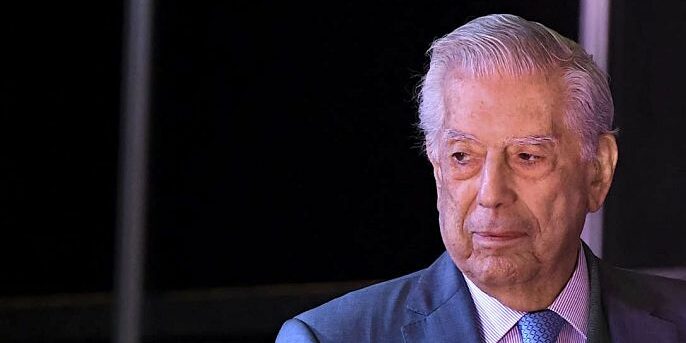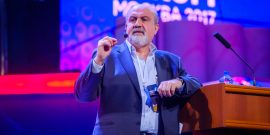A Classical Liberal in Peru
Karl Popper argued that the tribal spirit—eternally present in human affairs—offers us a false egalitarian order of the identity group, with its leader, its planning, and its coerciveness. In exchange, we give up individuality, freedom, and responsibility. Mario Vargas Llosa seizes on this idea in The Call of the Tribe, recently translated into English. There, he points directly to communism and nationalism as modern magnets that attract people to this idea of the ancestral “tribe,” and against which the sovereign individual rises up.
Vargas Llosa is a Spanish-Peruvian novelist, but turning to non-fiction, he now offers a reasoned tribute to freedom. This book merits a note of gratitude to its author (already deservedly honored with the world’s major literary awards, including the Nobel and Cervantes prizes). With The Call of the Tribe, Vargas Llosa bequeaths us his legacy in the world of political ideas. One has the impression that this is a self-imposed duty, as if he did not want his bibliography to end without leaving a guide to those classical liberal ideas that seem to him most worthwhile. To this end, he immerses himself in the work of seven authors. He goes deep into their work, arranges their ideas, and selects quotations. With his masterful and extraordinary prose, he succeeds in communicating truly complex ideas without losing any of their original content.
He presents us with a captivating personal and intellectual portrait of these seven thinkers and pays close attention to the circumstances of their lives and the people around them. Adam Smith in his club discussions, university life, and friendship with David Hume. Ortega in a Europe with totalitarianism on the rise, during the Spanish Civil War, and then in the post-war period. Hayek with Mises (though the two were not identical). Popper in New Zealand, at the London School of Economics, and then moving away from the poker waved by Wittgenstein. Aron facing off with the entire French intelligentsia, especially in those confusing days of May 1968. Isaiah Berlin in Washington DC during the Second World War and in Leningrad during his chaste and transforming night with the poetess Anna Akhmatova. And Jean-François Revel, finally, vital, jovial, wise, and overwhelming in his indictment of the liberticides.
Vargas Llosa’s interest in politics and his classical liberal vision is not new. Mauricio Rojas summarized this in Pasión por la libertad. El liberalismo integral de Mario Vargas Llosa. Readers of Vargas Llosa also have his articles, public appearances, and several novels, including Conversation in the Cathedral and The Feast of the Goat. For many of us, A Fish in the Water is on our list of favorite books. This narrative of his 1990 presidential campaign in Peru is at once a thrilling novel and a manual of classical liberal politics.
In The Call of the Tribe, Vargas Llosa praises the intellectual honesty of the authors he writes about (especially Jean-François Revel and Raymond Aron). However, the first author we should applaud for intellectual honesty is Vargas Llosa himself. He opens with an explanation of his own intellectual journey, which begins with Marx—whose works he actually reads, unlike so many neo-Marxists. He drifts away from Marxism as he witnesses with his own eyes what real socialism means in Cuba after its revolution and on his trip to the USSR. He speaks repeatedly of his disappointment with Jean-Paul Sartre, of whom he was a devoted follower, and, without disavowing Sartre’s intellect, he provides enough evidence to ensure no reader will forget that the father of existentialism defended the Soviet concentration camps.
Vargas Llosa moved slowly from his initial rejection of all kinds of dictatorships toward classical liberalism, advancing like a mountain climber, grasping firm anchors in order to dare to go further and further. He points to Popper, Hayek, and Berlin as “the three modern thinkers to whom I owe the most, politically speaking.” But Vargas Llosa also points to two non-writers as essential in his arrival to classical liberalism: Margaret Thatcher and Ronald Reagan. As he puts it, “I am convinced that both [Thatcher and Reagan] made a great contribution to the culture of freedom. And in any event, they helped me to become a liberal.” He does not hide—nor should he!—his admiration for the two great classical liberal politicians of the late twentieth century, who were decisive in demonstrating that freedom and responsibility are morally and materially superior to socialism.
When Vargas Llosa identifies with classical liberalism, he does so without opting for or excluding any of its schools. Rather than trying to convince us of his own vision of classical liberalism, he presents us with a big tent, a wide range of thinkers whose common feature is the belief that the individual is above the collective, that responsibility goes hand-in-hand with freedom, and that the ideal of freedom is supreme.
Mario Vargas Llosa’s book is full of joy and optimism. Freedom does not lead to chaos, rather it generates that Hayekian spontaneous order based on free choice and individual responsibility.
He does not identify with anarcho-capitalism, rather he believes that there should be a small but strong and efficient state that ensures “freedom, public order, respect for the law, and equal opportunities.” Although he is in favor of the state ensuring and even providing a high-level educational system for all, he believes that competition and private initiative are essential in this arena. When he speaks of equality of opportunity, he makes it clear that he does not identify this with equality of income, because “that would be possible only in a society run by an authoritarian government that would ‘equalize’ all citizens economically through an oppressive system.”
While he rejects the alignment of classical liberalism with what he calls an “economic formula of free markets,” he believes that economic freedom is “a key element” of classical liberal thought. This is why he repeatedly criticizes Ortega y Gasset for his rickety economic thinking and mistrust of capitalism.
In Vargas Llosa’s concept of classical liberalism, the idea of humility stands out. It translates into the effort of limiting power instead of exploiting it, and not laying claim to dogmatic and immutable truths. Because of our need for humility, Vargas Llosa believes that the idea of discussion and debate is essential. He sees this in the ever-open possibility of refutation, which he takes from Popper, and the confrontation of contradictory truths that he reads in Isaiah Berlin. It is this critical spirit that “breaks down the walls of closed society and exposes humanity to an unknown experience: individual responsibility.” That is why he always focuses on the idea of pluralism, which he considers a practical necessity for the survival of humankind. Pluralism should in no way be confused with relativism, because, following Popper, “truth has one foot placed in objective reality.”
Vargas Llosa also talks to us about the enemies of classical liberalism. The most important is constructivism. It is in his chapter on Hayek where he most emphatically denounces “the fatal desire to organize the life of the community from any center of power.” No less sharply, he rejects that other, much more devious, enemy of classical liberalism: mercantilism. Pointing to Hayek and Adam Smith, he contrasts capitalism with the mercantilist schemes of certain businesspeople and politicians who act to protect themselves from competition by regulations and protectionist politics.
Mario Vargas Llosa’s book is full of joy and optimism. Freedom does not lead to chaos, rather it generates that Hayekian spontaneous order based on free choice and individual responsibility. It is individualism that leads Vargas Llosa to be optimistic, in contrast to the pessimism that Ortega’s mass-man produces and who is merged into a collective being where he surrenders his individuality. For Vargas Llosa, freedom does not exist if it is not comprehensive: there can be no freedom without political freedom, economic freedom, and freedom of creation and thought. That is why the book is also an endorsement of liberal democracy and a rejection of any form of dictatorship.
We classical liberals often complain about our lack of clarity, style, and public appeal when presenting the ideas of liberty. As we read The Call of the Tribe, we hold in our hands what we want. Without being perfect, without being irrefutable—as his admired Popper would say—what Vargas Llosa has written deserves to be read by many people of many generations. It is impossible to find a better cicerone to lead us on an exquisite tour through the lush and flourishing garden of the ideas of liberty.
This article was originally published in Spanish in Cuadernos de Pensamiento Político Fundación FAES, n° 59: https://fundacionfaes.org/cuadernos-faes-de-pensamiento-politico-59/


